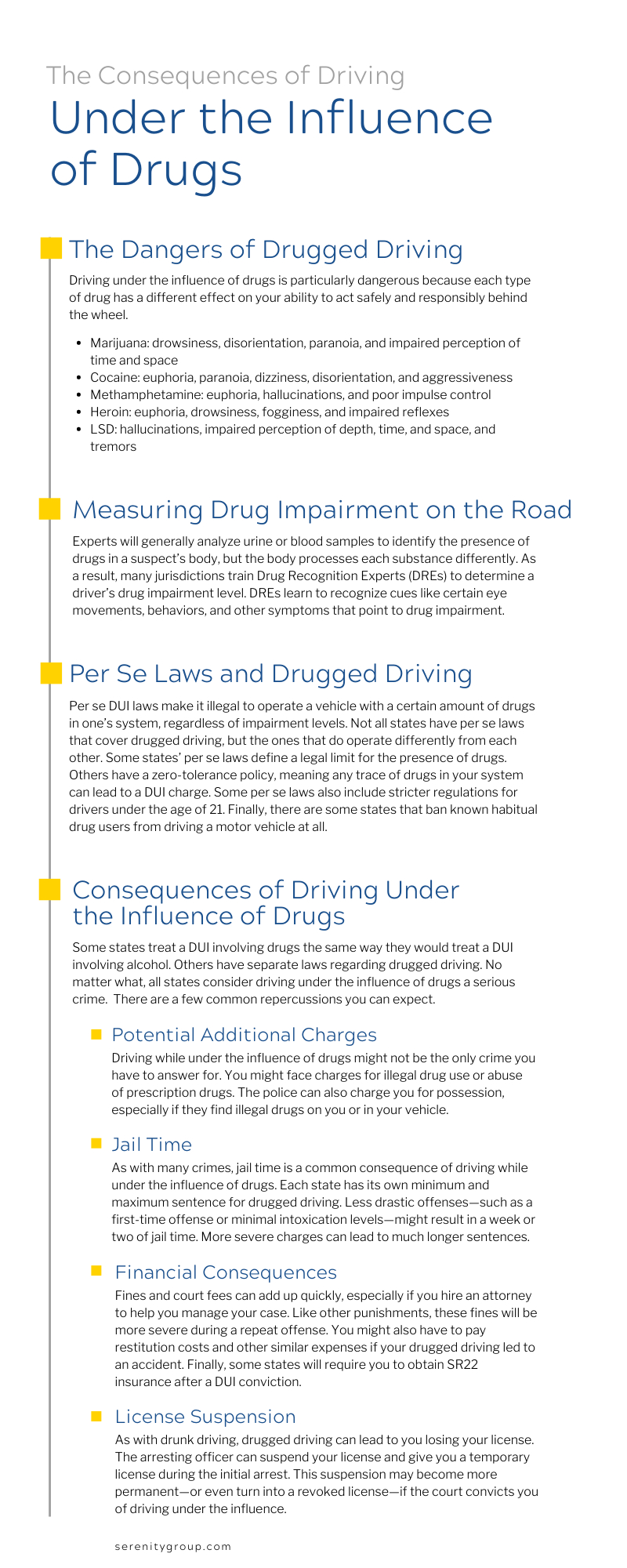The Consequences of Driving Under the Influence of Drugs

When most people hear the term ‘DUI,’ they think about driving under the influence of alcohol. However, a DUI charge can also refer to driving under the influence of drugs. As with drunk driving, drugged driving can impair your judgment, reaction times, motor skills, and other abilities that are essential to safe driving. If you get behind the wheel while under the influence of drugs—whether using said drugs was legal or not—you put yourself, your passengers, and everyone else on the road in danger. Both illegal and prescription drugs can make even the shortest commutes dangerous. Learn more about the risks and the consequences of driving under the influence of drugs with this thorough guide.
The Dangers of Drugged Driving
Driving under the influence of drugs is particularly dangerous because each type of drug has a different effect on your ability to act safely and responsibly behind the wheel. Some substances slow reaction times, others can increase aggression, and still others can cause drowsiness or dizziness. It’s important to know the effects of any drug you take. Here’s a rundown of common substances and their most frequent effects:
- Marijuana: drowsiness, disorientation, paranoia, and impaired perception of time and space
- Cocaine: euphoria, paranoia, dizziness, disorientation, and aggressiveness
- Methamphetamine: euphoria, hallucinations, and poor impulse control
- Heroin: euphoria, drowsiness, fogginess, and impaired reflexes
- LSD: hallucinations, impaired perception of depth, time, and space, and tremors
Many prescription drugs can also impair your ability to drive, even if you take them daily. Common effects include drowsiness, slow reaction times, and impaired coordination or motor skills. Be sure to check warning labels and ask your doctor or pharmacist about the side effects of your medication.
Measuring Drug Impairment on the Road
When a police officer pulls someone over who is drunk driving, they can use a breathalyzer test to determine the individual’s blood alcohol content level. Unfortunately, determining whether someone is under the influence of drugs is less straightforward. Experts will generally analyze urine or blood samples to identify the presence of drugs in a suspect’s body, but the body processes each substance differently. For example, traces of marijuana can stay in the body for weeks. Other substances have a much shorter processing time. This makes it difficult to determine if an individual was intoxicated at a specific time. As a result, many jurisdictions train Drug Recognition Experts (DREs) to determine a driver’s drug impairment level. DREs learn to recognize cues like certain eye movements, behaviors, and other symptoms that point to drug impairment.
Per Se Laws and Drugged Driving
Some states also use per se laws to convict drugged drivers. Per se DUI laws make it illegal to operate a vehicle with a certain amount of drugs in one’s system, regardless of impairment levels. Not all states have per se laws that cover drugged driving, but the ones that do operate differently from each other. Some states’ per se laws define a legal limit for the presence of drugs. Others have a zero-tolerance policy, meaning any trace of drugs in your system can lead to a DUI charge. Some per se laws also include stricter regulations for drivers under the age of 21. Finally, there are some states that ban known habitual drug users from driving a motor vehicle at all.
Consequences of Driving Under the Influence of Drugs
Some states treat a DUI involving drugs the same way they would treat a DUI involving alcohol. Others have separate laws regarding drugged driving. No matter what, all states consider driving under the influence of drugs a serious crime. Therefore, you can expect significant consequences to follow. Every case is different, which means the specific consequences you face will vary depending on certain details such as where you live, how intoxicated you were, or what kind of damage you caused. That said, there are a few common repercussions you can expect.
Potential Additional Charges
Driving while under the influence of drugs might not be the only crime you have to answer for. You might face charges for illegal drug use or abuse of prescription drugs. The police can also charge you for possession, especially if they find illegal drugs on you or in your vehicle.
Jail Time
As with many crimes, jail time is a common consequence of driving while under the influence of drugs. Each state has its own minimum and maximum sentence for drugged driving. Less drastic offenses—such as a first-time offense or minimal intoxication levels—might result in a week or two of jail time. More severe charges can lead to much longer sentences. It’s also possible for some states to waive a jail sentence altogether. This may happen if the defendant has an otherwise clean record and completes all other court-mandated requirements. If there is no jail sentence, the defendant will usually have to complete an alternative step, such as entering a rehabilitation program.
Financial Consequences
Drugged driving also comes with financial consequences. Fines and court fees can add up quickly, especially if you hire an attorney to help you manage your case. Like other punishments, these fines will be more severe during a repeat offense. You might also have to pay restitution costs and other similar expenses if your drugged driving led to an accident. Finally, some states will require you to obtain SR22 insurance after a DUI conviction. This policy will increase your insurance premium, but you can find the cheapest SR22 insurance in California or any other state by shopping around with Serenity Group. Like all other consequences, it’s important to keep up with SR22 insurance and all other fees and fines.
License Suspension
As with drunk driving, drugged driving can lead to you losing your license. The arresting officer can suspend your license and give you a temporary license during the initial arrest. This suspension may become more permanent—or even turn into a revoked license—if the court convicts you of driving under the influence. Once again, you will have to refer to your state’s specific rules regarding license suspension. To reinstate your license, you will have to wait until the end of your suspension period, meet all your court-mandated requirements, and reapply for a license through your DMV.
While drugged driving is similar to drunk driving, knowing the differences between the two can save you a lot of stress and hassle as you navigate your situation. As always, Serenity Group is here to answer any questions you might have about an SR22 requirement in your state. The more you know about your requirements, the easier it will be to reinstate your license and get back to the way life was before your DUI.


Recent Comments